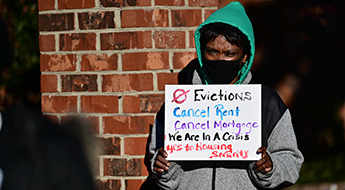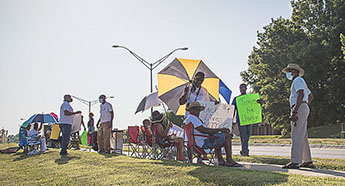Lincoln Quillian
Gordon S. Fulcher Professor of Decision-Making and Professor and Chair of Sociology
IPR Fellow and Chair of IPR's Program on Neighborhoods and Community Safety
PhD, Sociology, Harvard University, 1997
Social demographer Lincoln Quillian is interested in social stratification, race and ethnicity, urban sociology, and quantitative research methods. Most of his research has focused on how social structure and group demography influence inequality, intergroup attitudes, discrimination, and neighborhood segregation. He has published articles on the effect of the relative size of racial minority groups on racial attitudes, patterns of migration that underlie segregation on the basis of race and income in American cities, correspondence between audit measures of discrimination and survey measures of prejudice, racial segregation in adolescent friendship networks, and the influence of racial stereotypes on perceptions of neighborhood crime levels.
Recently, he has published on how multiple forms of segregation combine to produce neighborhood poverty concentration and on understanding racial discrimination in hiring through meta-analysis of field experiments. These projects have appeared as publications in a number of journals in sociology, demography, and social psychology.
Current Research
Quillian is the director of the Discrimination Meta-Analysis Project. This project aims to better understand discrimination against racial and ethnic minorities in labor markets around the world through a meta-analysis of audit and correspondence studies of discrimination. The project addresses questions such as: (1) What is the prevalence of discrimination against racial and ethnic minorities in hiring across countries in the world? (2) How do rates of hiring discrimination vary over time and across target groups? (3) How are national conditions and policies associated with levels of race and ethnic discrimination in hiring? (4) Estimating cumulative effects of racial discrimination through combining results from field experiments. This project has received support from the Russell Sage Foundation.
In addition, Quillian is working with on projects including a study of perceptions of Chicago neighborhoods with Kellogg social psychologist and IPR associate Ivuoma Onyeador, a study of how Zip Code of origination affects results of searches for college information with Carson Phillips, and a study of extended family influences on wealth inequality with Doron Shiffer-Sebba and Gabay-Egozi Limor.
Selected Publications
Quillian, L. and K. Karlson. 2023. How (not) to use risk ratios in sociological research. Socius: Sociological Research for a Dynamic World 9: 1–9.
Quillian, L. and J. Lee. 2023. Trends in racial and ethnic discrimination in hiring in six Western countries. Proceedings of the National Academy of Sciences of the United States of America 120(6): e2212875120.
Quillian, L. and A. Midtbøen. 2021. Comparative perspectives on racial discrimination in hiring: The rise of field experiments. Annual Review of Sociology 47: 391–415.
Quillian, L., J. Lee, and M. Oliver. 2020. Evidence from field experiments in hiring shows substantial additional racial discrimination after the callback. Social Forces 99(2): 732–59.
Quillian, L., J. Lee, and B. Honoré. 2020. Racial discrimination in the U.S. housing and mortgage lending markets: A quantitative review of trends, 1976-2016. Race and Social Problems 12(1): 13–28.
Quillian, L., A. Health. D. Pager, A. Midtbøen, F. Fleischmann, and O. Hexel. 2019. Do some countries discriminate more than others? Evidence from 97 field experiments of racial discrimination in hiring. Sociological Science 6(18): 467–96.
Quillian, L., D. Pager, O. Hexel, and A. Midtbøen. 2017. Meta-analysis of field experiments shows no change in racial discrimination in hiring over time. Proceedings of the National Academy of Sciences 114(41): 10870–5.
Quillian, L. 2017. Segregation as a source of contextual advantage. RSF: The Russell Sage Foundation Journal of the Social Sciences 3(2): 152–69.


